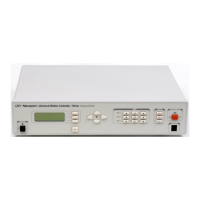This mechanism will block the portal through which the commands
were issued until all the commands issued have been executed.
It is, therefore, recommended that the user take advantage of ASCII
command,
HQ which tells the number of commands that can be put in
the "via point" buffer at any given time. This allows a user to control
the flow of commands manually, while ensuring the availability of
that portal for other commands such as
HP, TP, etc.
The trajectory generator checks if the "via point" buffer has a new
target position (i.e., any new move segments pending?) while the
current move is in progress. If "via point" buffer is empty, the group
comes to a stop upon completion of current move segment.
Otherwise, it begins a new move segment without stopping after
completing the current move. The group transitions from current
move segment to a new move segment smoothly if the tangential
velocity at the transition is ensured to be constant.
The ASCII command
HQ is used to query the available "via point"
buffer space. The commands
HL and HC are used to queue linear
move or circular move commands into the "via point" buffer. Refer to
the description of these commands in the commands section (See
Section 3: Remote Mode) for correct syntax, parameter ranges, etc.
Figure 4.3: Block Diagram of Via Point Data Handling by Command Processor
Move In Progress?
New group move command
Are there 10
move commands in
via point buffer?
Yes
Command flow control
Yes
No
Queue the move command
in via point buffer
Initiate the move
No
4-6 Section 4 – Advanced Capabilities

